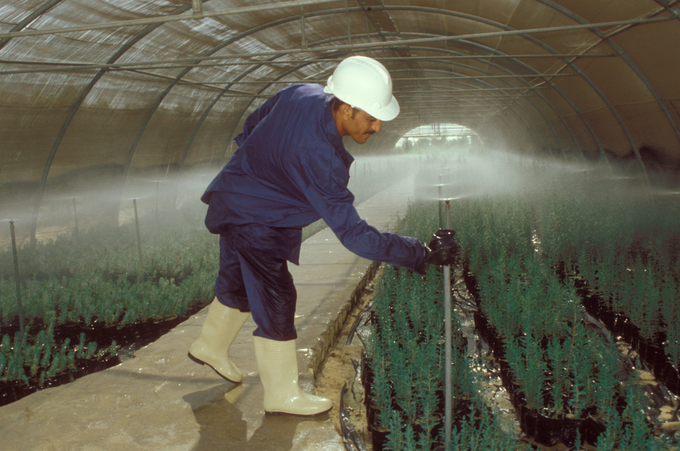November 27, 2025 | 00:01 GMT +7
November 27, 2025 | 00:01 GMT +7
Hotline: 0913.378.918
November 27, 2025 | 00:01 GMT +7
Hotline: 0913.378.918

Nursery worker adjusting sprinkler irrigation system in a greenhouse of cypress seedlings, Egypt. Photo: FAO/Rosetta Messori
For agrifood systems to adapt to climate change and become more sustainable, improving the quality and quantity of climate finance contributions to the sector is critical – that was the main message at the launch of the Food and Agriculture for Sustainable Transformation Initiative (FAST) held at the 27th United Nations Climate Change Conference (COP27) in Sharm-El Sheikh, Egypt.
The United Nations Climate talks are being hosted by Egypt this year and FAST was developed and initiated by the Egyptian Presidency in close collaboration with the Food and Agriculture Organization of the United Nations (FAO) and other stakeholders.
FAST comes at a time when the risk of hunger and malnutrition among the most vulnerable groups is getting worse and the world’s agrifood systems are increasingly impacted by climate variability and extreme weather events. Agrifood systems also contribute to the climate crisis, ecosystem degradation and biodiversity loss.
But the funding to transform agrifood systems to make them more sustainable, resilient and productive is grossly inadequate, and that is what this initiative hopes to address.
Access to climate finance at both farm and country levels remains insufficient and FAST aims to implement concrete actions to correct this to transform agriculture and food systems by 2030 while supporting food and economic security and the environment.
Speaking at the event, FAO Deputy Director-General Maria Helena Semedo, pointed out that while overall climate finance flows have been increasing over the past decade, the share allocated to agriculture has been steadily decreasing.
The agriculture and land use sector received $122 billion in financing between 2000 and 2018, representing 26 percent of the global climate finance flows to all sectors.
“That is why bold transformative actions are now needed to boost investment in agrifood transformation, support countries in accessing climate finance, and ensure that appropriate financial resources reach small and medium-scale food producers,” Semedo said.
FAST aims to make this possible by enhancing country capacities to identify and access climate finance and investment, giving stakeholders greater access to knowledge and developing guidelines and providing support in crafting appropriate climate action policies.
Promoting food security and diversity, empowering and engaging women, youth, Indigenous Peoples and people in vulnerable situations, using science and innovation to improve agricultural practices across the value chains - these are some of the principles that will guide FAST’s work.
“This partnership will rely on and harness the efforts started by previous initiatives such as the Glasgow breakthrough and will be nurtured by future (COP) Presidencies. Agriculture is higher than ever on the COP agenda, and FAO is committed to support all actors in their efforts to transform our agrifood systems to become more efficient, inclusive, resilient, and sustainable,” Semedo said.
The summit is being held at a time when estimates show that the world is falling behind on the goal of reducing emissions by 45 percent by 2030 to limit global warming to 1.5 degrees Celsius.
FAST is one of the key initiatives that FAO is a part of at COP27. The organization will use its expertise and experience to lead several discussions on how agrifood systems can be part of the solution to the climate crisis and how food security can be achieved.
(FAO.org)

(VAN) A new study reveals how the simultaneous effects of ocean acidification, salinity and loss of oxygen are making the world more fragile.

(VAN) Hopes are growing that the creation of the first 3D turkey gut model could be a turning point in the battle against the virulent blackhead disease.

(VAN) Tyson, America’s biggest meat supplier, plans to shutter one of its largest beef processing plants as the industry continues to struggle with low cattle supplies and political pressure from Washington.

(VAN) New FAO study shows how digital solutions are empowering farmers and fishers to prevent losses and build resilient agrifood systems.

(VAN) Brazil's COP30 presidency pushed through a compromise climate deal on Saturday that would boost finance for poor nations coping with global warming but that omitted any mention of the fossil fuels driving it.

(VAN) Poultry farmers in the UK have been warned that they could face one of the worst winters yet for bird flu.

(VAN) Prices of main-crop paddy have risen sharply, with jasmine rice hitting 16,100 baht per tonne — the highest level in years.